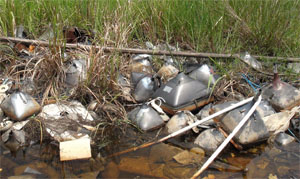Danger in disposal
Published: 8 November 2013
Don't let your old office "electricals" become somebody else's environmental nightmare, writes Dr Ann Galbraith, the University's Environmental Adviser.
It might seem unlikely, but the uwanted office and laboratory equipment that we discard could one day soon be somebody's environmental nightmare in a different part of the world. This could apply to old computers, PC monitors, printers and other, seemingly everyday office and laboratory equipment, writes Dr Ann Galbraith, the University's Environmental Adviser.
 Each year the University disposes in excess of 1000 items of electrical and electronic equipment from offices and laboratories. To deal with this, following a tender process, a contract has been issued to a single company that has been appointed on the basis of:
Each year the University disposes in excess of 1000 items of electrical and electronic equipment from offices and laboratories. To deal with this, following a tender process, a contract has been issued to a single company that has been appointed on the basis of:
- their ability to offer the service required
- their record of legal compliance
- their ability to help the University meet its carbon reduction commitments.
The current contract holder is CCL (North) who offer a service that is free of charge and where, in some specific cases, there is a refund for equipment that has a value.
From time to time people ask why the University requires disposals to be carried out in this way and why we can’t just direct these items to any organisation that offers this service to us free, or in some cases in conjunction with a tempting refund.
 Often such organisations make glowing claims for their good environmental and social credentials, however there can be significant risks associated with using any organisation that sends our electrical and electronic equipment outside the UK. One of the reasons that CCL(North) has been selected by the University is because the items that we dispose through them are all processed within the UK.
Often such organisations make glowing claims for their good environmental and social credentials, however there can be significant risks associated with using any organisation that sends our electrical and electronic equipment outside the UK. One of the reasons that CCL(North) has been selected by the University is because the items that we dispose through them are all processed within the UK.
Recently the media have been publicising accusations that one of the UK’s largest recycling companies has been sending shipments to Ghana, in contravention of that country’s legislation. In many cases, when such items arrive in less developed countries the methods used to process them pose significant risk of harm to the operators, the environment and the local community. The images here - courtesy the Basel Action Network - illustrate what can happen when organisations send electrical items outwith the EC.
Please continue to use the University’s contractor for the disposal of electrical and electronic items so that we may avoid inadvertently contributing to these illegal practices. Further information on the University’s arrangements for disposal of electrical and electronic equipment can be found on SEPS web site at http://www.gla.ac.uk/services/seps/waste/electricalelectronicequipment/
First published: 8 November 2013
<< November

